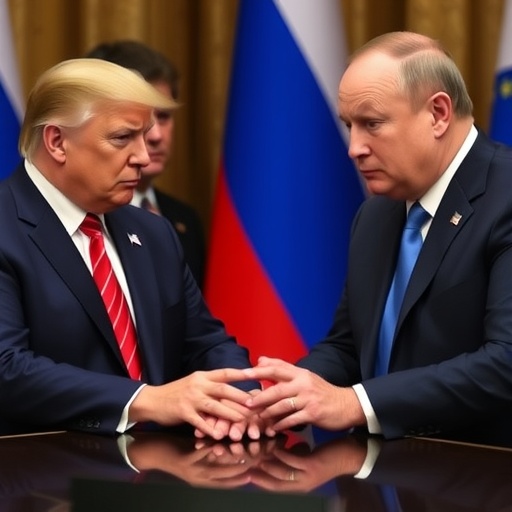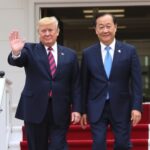Trump Cancels High-Stakes Putin Meeting, Insists on Russia-Ukraine Peace Deal Before Any Talks
In a dramatic escalation of U.S. foreign policy, President Donald Trump has abruptly canceled a planned summit with Russian President Vladimir Putin, declaring that no meeting will occur until a concrete peace deal is secured between Russia and Ukraine. The announcement, delivered during a fiery White House press briefing on Thursday, comes amid intensifying global tensions over the ongoing conflict, with Trump also unveiling fresh sanctions targeting major Russian oil companies. This move postpones what was anticipated to be a pivotal Russia-Ukraine summit, potentially reshaping diplomatic efforts to end the war that has ravaged Eastern Europe for over two years.
Trump’s decision marks a significant shift in his approach to Putin, with whom he has historically maintained a complex rapport. “We’re not sitting down for tea until there’s real progress on a peace deal,” Trump stated emphatically, his voice echoing through the briefing room. “Russia needs to pull back from Ukraine, or there will be no handshakes from me.” The president’s ultimatum has sent shockwaves through international circles, as allies and adversaries alike grapple with the implications for global security and energy markets.
The conflict between Russia and Ukraine, which erupted in February 2022, has already claimed tens of thousands of lives and displaced millions. According to the United Nations, over 10,000 civilians have been killed, with the true toll likely much higher due to underreporting in war zones. Economic fallout has been staggering: Ukraine‘s GDP contracted by 30% in 2022, while Russia faces mounting isolation from Western sanctions. Trump’s intervention underscores the U.S.’s pivotal role in brokering any resolution, especially as European nations grow weary of the protracted stalemate.
Trump’s Ultimatum: No Summit Without Ukraine Peace Breakthrough
President Trump’s cancellation of the Putin meeting stems from frustration over stalled negotiations in the Russia-Ukraine war. Originally scheduled for next month in Geneva, the summit was intended to facilitate direct talks on a potential peace deal. However, Trump cited recent Russian military advances in eastern Ukraine—including the capture of key territories like Avdiivka—as evidence that Moscow is not serious about de-escalation.
“I’ve spoken to Putin many times, and I know when someone’s playing games,” Trump remarked, referencing his past interactions with the Russian leader during his first term. In 2018, the two met in Helsinki, where Trump famously defended Putin‘s denial of election interference allegations. But this time, the tone is markedly different. Advisors close to the White House indicate that Trump views the current crisis as a leverage point to force concessions, potentially including the withdrawal of Russian troops from occupied regions and guarantees for Ukraine‘s sovereignty.
The postponement has immediate diplomatic ripple effects. Ukrainian President Volodymyr Zelenskyy, who was set to join the discussions, praised Trump’s stance in a televised address. “This is the tough leadership Ukraine needs,” Zelenskyy said, adding that any peace deal must include reparations for war damages estimated at over $400 billion by the World Bank. On the Russian side, Kremlin spokesperson Dmitry Peskov dismissed the move as “American posturing,” but insiders suggest Putin may be open to indirect talks through neutral mediators like Turkey or China.
Historical context adds weight to Trump’s strategy. Previous U.S.-led initiatives, such as the Minsk Agreements of 2014 and 2015, failed to prevent escalation, leading to the full-scale invasion. With over 500,000 troops mobilized on both sides, according to NATO estimates, the urgency for a viable peace deal cannot be overstated. Trump’s demand could either accelerate negotiations or harden Russian resolve, depending on how Moscow responds.
Fresh Sanctions Hammer Russia’s Oil Empire Amid Energy Crisis
Complementing the diplomatic freeze, Trump simultaneously announced new sanctions on Russian oil companies, targeting giants like Rosneft and Gazprom Neft. These measures, detailed in an executive order signed earlier today, prohibit U.S. firms from engaging in transactions with these entities and freeze their assets in American jurisdictions. The sanctions aim to choke Russia‘s war funding, as oil exports account for nearly 40% of its federal budget, per International Energy Agency data.
“We’re hitting them where it hurts—their oil wallets,” Trump declared, emphasizing the economic pressure. Since the invasion began, Russia‘s oil revenues have plummeted by 30% due to prior Western restrictions, forcing Moscow to pivot to buyers in India and China at discounted rates. The new penalties could exacerbate this, potentially reducing Russian GDP by an additional 2-3% in 2024, according to economists at the Peterson Institute for International Economics.
The impact on global energy markets is already evident. Brent crude prices surged 5% following the announcement, reaching $85 per barrel, as traders fear supply disruptions. European nations, heavily reliant on alternative sources since cutting Russian gas imports, face renewed inflationary pressures. Germany’s Economy Minister Robert Habeck warned that prolonged sanctions could add €50 billion to the EU’s energy costs this year.
In Ukraine, the sanctions are hailed as a lifeline. “Every barrel of Russian oil denied funds the bombs falling on our cities,” said Ukrainian Foreign Minister Dmytro Kuleba in a statement. Yet, critics argue the measures might inadvertently boost Putin‘s domestic narrative of Western aggression, rallying Russian support for the war. Nonetheless, Trump’s administration projects that sustained pressure could force Russia back to the negotiating table within months.
- Key Sanction Targets: Rosneft (world’s largest publicly traded oil company), Gazprom Neft, and Lukoil subsidiaries.
- Expected Revenue Loss for Russia: Up to $20 billion annually, based on current export volumes.
- Global Repercussions: Potential 10% rise in U.S. gasoline prices if supply chains tighten.
Global Reactions Pour In as Trump Reshapes Russia-Ukraine Dynamics
The international community has responded swiftly to Trump’s bold maneuvers. NATO Secretary General Jens Stoltenberg called the cancellation “a necessary signal to Putin,” pledging increased military aid to Ukraine totaling $60 billion from alliance members this year. In contrast, Chinese President Xi Jinping urged “restraint from all parties” during a call with Trump, hinting at Beijing’s interest in mediating a peace deal to safeguard its Russian energy imports.
European leaders are divided. French President Emmanuel Macron advocated for renewed diplomacy, stating, “Sanctions alone won’t end this war; we need a framework for talks.” British Prime Minister Rishi Sunak, however, aligned closely with Trump, announcing parallel UK sanctions on Russian oligarchs. Domestically in the U.S., bipartisan support emerged, with Senate Majority Leader Chuck Schumer praising the move as “long overdue,” while some Republicans like Senator Rand Paul cautioned against escalating to broader conflict.
Analysts from think tanks like the Brookings Institution highlight the high stakes. “Trump’s approach could isolate Russia further, but it risks pushing Putin toward desperate measures,” said expert Fiona Hill, a former National Security Council advisor. Public opinion polls reflect this tension: A recent Pew Research survey shows 62% of Americans favor stronger action against Russia, but only 45% support direct U.S. involvement in a peace deal.
In Ukraine, morale has surged. Kyiv’s streets filled with protests supporting Trump’s stance, with banners reading “Peace Through Strength.” Russian state media, meanwhile, portrays the U.S. president as a warmonger, amplifying anti-Western sentiment. Social media buzz has exploded, with #TrumpVsPutin trending worldwide, amassing over 2 million posts in 24 hours.
Charting the Path Forward: Challenges and Opportunities for Ukraine Peace
Looking ahead, Trump’s demands outline a roadmap for any future Putin summit. Key elements of a prospective peace deal include demilitarization zones along the Russia-Ukraine border, monitored by UN peacekeepers, and economic reconstruction aid for Ukraine pegged at $1 trillion over a decade. Trump has floated the idea of U.S.-guaranteed security pacts for Kyiv, similar to NATO’s Article 5, to deter future aggression.
Obstacles remain formidable. Russia insists on recognition of annexed territories like Crimea and Donbas, demands Ukraine remain neutral, and seeks sanctions relief—non-starters for Western allies. Negotiations could drag into 2025, especially with U.S. elections looming. Yet, opportunities exist: Recent battlefield setbacks for Russia, including ammunition shortages reported by the Institute for the Study of War, might compel Putin to compromise.
Economic incentives could tip the scales. A peace deal might stabilize global food supplies, as Ukraine—the breadbasket of Europe—has seen grain exports drop 50% due to Black Sea blockades. The World Food Programme warns of famine risks in Africa without resolution. For Russia, reintegration into world markets could alleviate its 7% inflation rate and ruble volatility.
Trump’s team is preparing contingency plans, including virtual talks if progress stalls. International envoy Kurt Volker, Trump’s former special representative for Ukraine, emphasized, “This is a pivotal moment; a deal now could prevent a frozen conflict lasting decades.” As the world watches, the coming weeks will test whether Trump’s hardline tactics yield a breakthrough or deepen the divide between Russia, Ukraine, and the West.
In the broader geopolitical landscape, this development underscores shifting alliances. India’s neutral stance, buying discounted Russian oil worth $50 billion last year, complicates enforcement, while Brazil’s President Lula da Silva offers to host peace talks. Ultimately, the success of Trump’s strategy hinges on unified international pressure, with the potential to forge a lasting peace deal or prolong the suffering in Ukraine.








